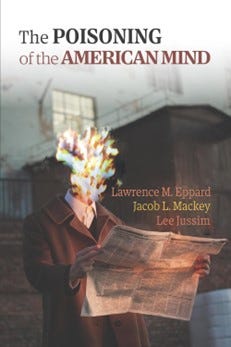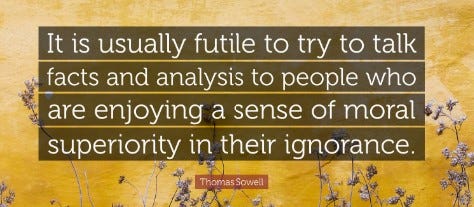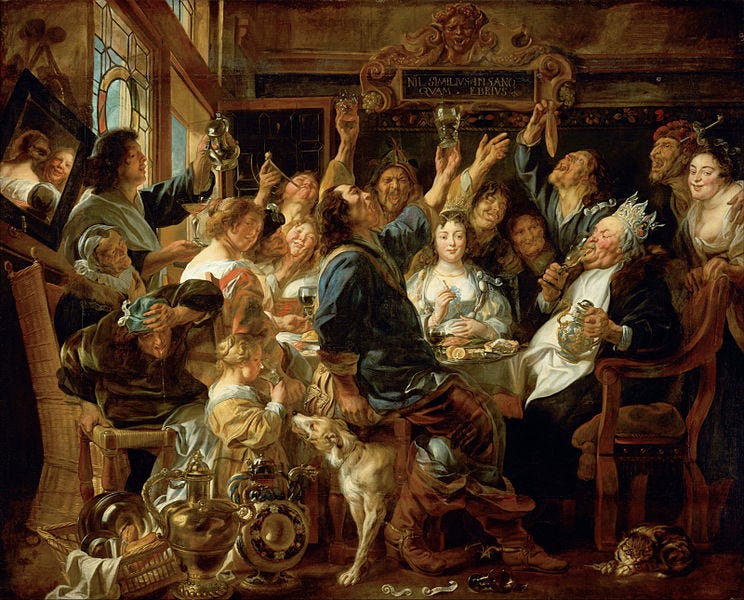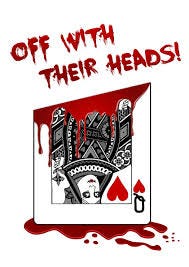This is a guest post by Jacob L. Mackey, who is Associate Professor of Classics at Occidental College in Los Angeles, where he teaches Greek and Latin languages and literatures, their transformative reception by African-American writers, their centrality to the American project of self-governance, and their power to transport us beyond our current culture of resentment. He recently changed his focus from antiquity to the present (and to the relevance of antiquity for the present) in response to what he saw as an existential crisis of our democracy that began in 2016 and reached a peak in 2020.
He is faculty advisor for the student Persuasion club, which provides a space for the free exchange of ideas on campus. He grew up between Austin, TX, and a small village in Kerala, in south India. The darker side of his experience in India—growing up in a cult—is captured in this film. He is planning a memoir about the brighter side. He is the author of Belief and Cult: Rethinking Roman Religion (Princeton University Press, 2022) and a founding member of Free Black Thought. He tweets here.
Lee’s Note:
This essay debunks claims about the racism of the SAT (and, by extension, many other standardized achievement tests). But why do so many people believe the SAT is racist? The essay starts out by introducing our new book, which includes an essay by Jacob (hence, “Jake”) on “virtuous lies.” Jake first explains the concept and compares and contrasts it with seemingly related ideas, such as bullshit, noble lies and luxury beliefs. After having laid that groundwork, Jake goes on to explain why claiming that the SATs are racist is a virtuous lie, and that eliminating the SATs from college admissions is likely to do more harm than good to the intended beneficiaries of such polices.
By Jacob L. Mackey
My brand new book, with first editor/co-author Lawrence Eppard and co-editor/co-author Lee Jussim, titled The Poisoning of the American Mind, attempts to document the bipartisan problem of misleading claims and bad information that currently dogs our country, and to offer some solutions for “cleaning epistemic house.”
The book includes 50 essays by a broad, interdisciplinary set of writers, including people like Jonathan Rausch, Michael Shermer, Jonathan Haidt and many more (including by the three editors). It spans about 350 pages, which means that each chapter is a relatively short, easy read of typically 3-10 pages. The essays are arranged under 5 headings, “Defending Truth,” “Problems in Right-Wing Silos,” “Problems in Left-Wing Silos,” “I Don’t Know, Therefore Aliens,” and a final section, “Parting Thoughts,” which points toward solutions.
Virtuous Lies
The section of the book on “Right-Wing Silos” deals with the misleading information and outright lies that swamp the right side of the partisan divide. The section on “Left-Wing Silos,” which deals with similar problems on what currently passes for a left in America,” includes my chapter on “virtuous lies.”
I introduced the term “virtuous lie” last year, in the pages of American Affairs. As I defined it there, a virtuous lie is:
a false, misleading, or highly contestable claim that is promulgated without qualification as flatly true in order to serve a purportedly emancipatory end.
Another way to put it is that a virtuous lie is moralized misinformation. It is misleading information that carries a positive moral valence. Believing a virtuous lie is “good.”
I discussed several such lies, including the lie that we’ve established what “implicit bias” is and have proved that it causes “unequal treatment of people based on race, ethnicity, gender identity, sexual orientation, age, disability, and other characteristics” and the lie that there is an epidemic of “police hunting and killing black people.” As my co-author Julian Adorney and I discussed in Quillette earlier this year, the mental health consequences of such lies for young black Americans likely include the dramatic recent increases in depression and suicidality seen among this cohort.
Fortunately, lies such as these are easily debunked. But merely to point out their epistemic shakiness is to ignore the ultimate point of virtuous lies, which is to serve a liberatory cause, such as eliminating racial health disparities or putting an end to police violence. Equally important, believing and promulgating virtuous lies marks us as “good people,” while questioning or refusing to assent to these lies renders us morally suspect. Questioning the lie is tantamount to questioning the worthiness of the goal it underwrites.
Virtuous lies differ from several adjacent epistemic phenomena. There are white lies, of course, minor falsehoods that spare someone’s feelings, such as, “Your song on YouTube is great.” There is also bullshit, as defined by philosopher Harry Frankfurt. For Frankfurt, bullshit is characterized by a “lack of connection to a concern with truth” or “indifference to how things really are.” Frankfurt himself identified Donald Trump as a champion bullshitter. Trump just says whatever he thinks it would be useful for him to say at any given moment. It appears that the question of whether his claims truly match reality rarely enters his mind. Of course, he also tells what I would call vicious lies, such as that the 2020 election was “rigged.” These are coldly calculated and designed to mislead people.
Virtuous lies differ from bullshit. They are typically asserted as doctrine. One test for their doctrinal status is this: try to deny or negate one on a college campus. Try, for example, to say on a college campus, “Implicit bias has not been shown to cause unequal treatment of minorities” or “There appears to be no bias in police use of lethal force” and see what happens to you. You will be dealt with as the church once dealt with heretics. Sometimes, I’ll grant, virtuous lies and bullshit are mingled. Kimberlé Crenshaw, famous for her theory of “intersectionality,” recently said on X that black women “make up a 3rd of” police killings, “with the majority unarmed.” She pulled these two claims out of a hat, at best. They are bullshit. But they are meant to bolster the virtuous lie, which carries the force of dogma, that “the simple status of being Black,” or doing just about anything “while Black,” is “an apparent capital crime” that will result in the “state violence” of murder by police, as she has written elsewhere.
Virtuous lies also differ from noble lies, a term that goes back to Plato. As I explained previously, Plato’s noble lies were designed to reconcile people to their unequal place in the social hierarchy by convincing them that it was ordained by nature. Today, people typically use the term “noble lies” for claims that are not precisely true but that are thought to be justified because they supposedly serve some greater good. An example is Anthony Fauci’s claim, early in the COVID epidemic, that it was unnecessary to mask. It now appears possible that at the time, he thought masking was important but claimed that it was not (i.e., he lied) in order to avoid a run on masks that were urgently needed by medical personnel. It’s also possible that Fauci truly believed masks were unnecessary, but lied later when he backtracked and let on that they were necessary. Either way, he appears to have told a noble lie.
Virtuous lies are similar to noble lies in that both misrepresent reality in order to serve a good cause. However, I suggest that virtuous lies are a subset of noble lies. Noble lies in and of themselves need not have a “social justice” flavor. Masks, for example, had not yet been coded “blue” when Fauci made his remarks. There are many truths that the government and experts paternalistically shield us from, telling us noble lies for our own good. Examples include alarmist warnings about how we have just “two years to save the world” from climate change or about the dangers of drinking alcohol while pregnant and a host of other health-related advice from “trusted” sources. In contrast to noble lies, a social justice coding, usually connected to identity and oppression, is essential to the subset of noble lies that are virtuous lies.
Indeed, virtuous lies are always and only about oppression and inequality related to race, ethnicity, gender, sexual orientation, disability, and so on. Unlike the broader category of noble lies, they are not about such universal concerns as the planet or public health. Part of the definition of a virtuous lie is that it is a catastrophizing misrepresentation of the oppression to which some “marginalized” group is subjected by “oppressor” groups. It feels more virtuous to believe the starkest, most apocalyptic claim about oppression and inequality rather than the more nuanced, less categorical, and less alarming claims that are typically more accurate. To believe the latter can feel like a failure of “moral clarity” or of allyship.
Finally, virtuous lies are intimately related to and yet importantly distinct from Rob Henderson’s luxury beliefs, which are “ideas and opinions that confer status on the upper class at very little cost, while often inflicting costs on the lower classes.” Although Henderson uses an epistemic term, “belief,” it appears that luxury beliefs are in fact normative phenomena. That is, they urge a course of action. Examples Henderson gives include “defund the police,” “decriminalize drugs,” “society should ‘evolve’ beyond” traditional families, and “get rid of the SAT.” All of these are programs of action, not representations of matters of fact.
The defining difference between virtuous lies and luxury beliefs is the difference between description and prescription. There’s an easy test for this. Just check whether it makes sense to say an idea is true or false. “The police are hunting black people” is a description of the world that is either true or false. In contrast, “defund the police” is not a description of the world and cannot be said to be true or false. Rather, it is a prescription that, if put into action, will have good or bad consequences.
So, we may say that the two are linked as follows. Virtuous lies purport to represent states of affairs in the world and are designed to serve purportedly emancipatory ends. Thus, if a virtuous lie is accepted as true, it is easily pressed into the service of a related luxury belief. It helps to believe something like the factual claim that the police are hunting black people in order to accept the normative call to defund the police. If you believe that the traditional family is “not good for society,” then you may be predisposed to endorse the normative proposal that society should “evolve” beyond it. If you believe that SATs and other standardized tests “exclude black students” and “justify discriminating against them,” as Ibram X. Kendi claimed, then you are likely to be persuaded that we should “get rid of the SAT.” Virtuous lies, then, are the misleading informational foundations upon which luxury beliefs, with their misguided practical programs are built.
There is another difference between virtuous lies and luxury beliefs that is worth noting here. Yascha Mounk has recently argued that Henderson’s definition of “luxury belief” contains some non-essential attributes. The most important of these in this context is that Henderson’s “emphasis on social status implicitly ascribes nefarious motivations to people who embrace luxury beliefs,” and even implies “that those who profess particular luxury beliefs are consciously lying about what they believe.” In contrast to this, virtuous lies are held sincerely by most believers. As I argued in American Affairs, I coined the term virtuous lies not because the majority of people who endorse them intend to deceive but because their knowledge-economy originators and mass propagators—often distinguished scholars, academic institutions, or media organizations—are perfectly well positioned to know the truth but have chosen, sometimes in spite of advice not to do so, to profess the falsehood instead. The consumers of knowledge-economy products who trustingly accept the lie are not themselves lying when they innocently repeat it. The term “lie” refers to the dishonest context of its creation.
Further to this point, the apparent virtuousness of virtuous lies is an important contributor to their persuasiveness and hence to their epistemic success. It can feel morally “good” to believe the most alarmist or catastrophizing claims about social justice-related matters, and it can feel like a failure of moral commitment or of allyship to doubt such claims. These facts do not make those who believe and repeat virtuous lies insincere. Rather, the strong moral valence of virtuous lies makes them effective rhetorical devices and contributes to their sincere acceptance as true, despite their falsity.
The Racism of the SAT is a Virtuous Lie
So much for my theory of virtuous lies. Now let’s discuss one. Recall that Henderson identified “get rid of the SAT” as a luxury belief. This luxury belief is based on a virtuous lie. The lie is that the SAT and other standardized tests are racist. It has even been claimed that the SAT merely “measures Whiteness.” You can immediately see the “virtue” in believing such lies. Black and Hispanic students have for decades done less well on the SAT and other standardized tests than have white students. (Few care that Asian American students trounce white students on these tests). If you believe that the tests are racist, you immediately relieve yourself of the trouble of explaining a glaring academic disparity by simply explaining it away. Nothing to see here but a racist instrument . The practical solution—the luxury belief—suggests itself or has an intuitive appeal: get rid of the SAT. That’s much easier than seeking ways to help black and Hispanic students improve their performance.

I believed this lie for decades. Years ago, in the ‘80s, my father explained to me that standardized tests are biased in favor of patrician-class white people, because they test for cultural knowledge that is second nature if you are raised in a middle- or -upper-class WASP household but obscure if you grow up in other socio-economic or cultural circumstances. As Jeffrey Aaron Snyder points out on an episode of the Banished podcast with Amna Khalid, a classic example of such biased cultural material is the word “regatta,” a term whose use is confined to the Harvard set if ever there was one, but it is a quarter century since it has appeared on a test. Moreover, Snyder notes, critics of standardized tests can rarely produce a current example. Harvard Law professor Lani Guinier devoted a book, The Tyranny of Meritocracy, to denouncing “testocracy,” but, according to a review by Snyder, was “unable to provide a single specific example of racial or class bias on the test.”
So, I believed what my father told me—again, it was no doubt true at the time—and I have never encountered anything, in any social or academic setting or in the media, to suggest that I should revise that belief. I have probably enunciated the belief myself dozens of times over the years and never met with anything but nodding approval (such has been the ideological homogeneity of my social milieu).
I did not seriously revisit my belief in the SAT’s bias until the summer of 2020, when I was forced to revisit many of my beliefs. You see, my kids are black, so I had an urgent and deeply personal interest in assessing the many new policies and practices that were being promoted to “help” black people, especially black children like mine, that summer. What I learned was that my belief, however true it may once have been, now reflected a virtuous lie.
Ibram X. Kendi is, as noted, a highly visible proponent of the lie. He has written that standardized tests are claimed to be "race-neutral" but in reality they "exclude black students":
Standardized tests have succeeded in their original mission of figuring out an “objective” way to rule nonwhites (and women and poor people) intellectually inferior and to justify discriminating against them in the admissions process.
Kendi’s phrase “original mission” is important. It refers to the claim, common among anti-testing activists, that standardized tests have a racist, eugenicist origin. On this view, the SAT is merely fulfilling its “original mission” of keeping black students out of college. This is, of course, an example of the genetic fallacy, that is, the discrediting of something because of its origin, without any attention to its current status. It’s logically possible, and also happens to be true, that the SAT was initially designed with racist intentions but has been transformed and in recent iterations bears no trace of that ugly past. (In fairness to the SAT, it was also originally designed to “replace the old hereditary elite that attended schools like Harvard and ran America with a new one based on intelligence and academic performance,” which is not an unworthy goal.)
Of course, anti-testing advocates like Kendi also assert that the test is still racist. The main argument that the SAT is racist is the disparate performance of various groups on it. The College Board administers the SAT. They report that in 2023, 24% of all test-takers scored above 1200. Broken down by the crude racial classifications that the federal government has saddled us with, 29% of white test-takers, 11% of Hispanic test-takers, and 7% of African American test-takers scored above 1200. The “disparate impact” of the SAT justifies claims that it is racist. But racist in service to whom? After all, 56% of “Asian” (one of our crudest racial categories) test-takers score over 1200.
In the wake of George Floyd’s murder, associations of educators, such as the New Jersey Education Association (NJEA), redoubled their advocacy against standardized tests, holding webinars with titles like “The Racist History of Standardized Testing.” Nonprofit organizations like the National Education Association and The National Center for Fair & Open Testing (also known as FairTest) have for decades opposed standardized testing and supported “test optional” or “test free” college admissions. FairTest keeps a running list of the 2000+ institutions that have made SATs optional or discontinued their use entirely.
The University of California (UC) system is one of these 2000+ institutions. In 2020, they dropped standardized tests, partly in response to a 2019 lawsuit which claimed that the SAT and ACT “disadvantage students who are poor, black, and Hispanic,” that is, are “racist.”
In a meeting of the UC board of regents convened on May 21, 2020 to discuss the matter, regents, faculty members, and UC graduates talk about the “racism” of standardized tests. The minutes show that the supposed racism of standardized tests played a significant role in deliberations:
“Cecilia Castro, Education Director at the Dolores Huerta Foundation…urged the Regents to make history, support anti-racist admissions, and find new ways to define talent, and she asked that the University not perpetuate the same inequities in the future.”
UC Student Association (UCSA) President Varsha Sarveshwar, a recent UC Berkeley graduate “believed that it was classist and racist to expect lower-income students, disproportionately black, Latino(a), and Native American, as well as rural students, to prepare [for the test] on their own.”
Faculty Representative Kum-Kum Bhavnani: “No one disputed that the SAT was racist, but the way in which UC used the SAT stopped it from being racist.”
“Regent Estolano agreed that the SAT was a racist test and a filtering mechanism.”
“Regent Sures stated his belief that the SAT was a racist test and expressed his dislike of it.”
The UC board of regents made its decision and published it that same day. They wrote that suspending the tests "improves educational...equity." It is important to recall, of course, that this decision was taken at the height of COVID, when there were indeed disruptions to schooling and to test-taking that needed to be accounted for. However, the lawsuit that prompted UC’s reevaluation, the discussion revealed in the minutes, and the loaded term “equity” in the board’s decision all suggest that a desire to combat the “racism” of standardized tests was a significant factor in the board’s decision.
Bias in the SAT is at most Minimal
The irony of all this is that UC’s own task force, the Standardized Testing Task Force (STTF), had issued a comprehensive report that very February which stated that "racial bias in the SAT...is, at most, a minimal problem" with "effects...far too small to explain much of the SAT gap" of which I provided a snapshot, above.
To get into the weeds a bit, the STTF cited a paper purporting to show that on the SAT, “the math test is not biased,” while on the SAT’s verbal test, there is “no evidence of bias in Latino-white comparisons.” However, evidence of bias “in favor of whites for easier questions and in favor of African-Americans for more difficult questions” was discovered. The STTF concludes that “the effects are far too small to explain much of the SAT gap in test scores between black and white students.”
Given these and other findings, the STTF had advised:
we do not recommend making the SAT and ACT optional for applicants for admission to UC at this time. The potential effects of making these tests optional deserve considerably more research than has yet been conducted, certainly at a university the size of UC.
The STTF’s advice was, of course, ignored. Why “douse the flames of social justice with the fire retardant of fact,” as Caitlin Flanagan quipped? UC Riverside (UCR) Chancellor Kim Wilcox made a valiant attempt to draw attention to such facts during the board of regents’ meeting. Here’s Wilcox from the minutes:
“UCR has relied on the SAT in admissions and has been very successful in recruiting a highly diverse student body. SAT scores added predictive value in terms of student retention, GPA, and graduation. The STTF found that standardized tests served as a tool to increase representation. He urged the University to be careful when making changes.”
Eliminating the SAT does Nothing to Help Minority Students or Reduce Disparities
It’s worth drawing attention to what Wilcox says here about “increasing representation.” The STTF had found, as the New York Times summarizes it, that “including the SAT and ACT in the formula for admissions helped some black, Hispanic and low-income students by offering an additional metric for those who might have been rejected based on grades.” In contrast, as one expert put it, “the UC decision to drop the SAT may do little to nothing to help minority students in California.”
Thus, despite virtuous lies from anti-SAT activists like the NEA, FairTest, and Kendi, not only are SATs not racist, they do not or at least need not deter racial diversity in admissions. Another thing SATs are often alleged to do but in fact do not do is improve with tutoring. This prevalent untruth is reflected in UC Student Association President Varsha Sarveshwar’s belief, recorded in the minutes of the UC board of regents’ meeting, “that it was classist and racist to expect lower-income students…to prepare [for the test] on their own.” She further opined that “[p]aid test preparation was like an extra course for wealthy students.” Similarly, Cecilia Castro, the Education Director at the Dolores Huerta Foundation, had worried that “UC’s reliance on standardized tests…created a back door for wealthy white students to gain access to UC,” because they could simply test prep their way in. Castro’s comment illustrates neatly the way the “test prep” canard dovetails with the virtuous lie about the SAT’s racism.
The reality is that test prep probably produces small increases in SAT scores. A 2009 study estimated that test preppers gained “roughly 11 to 15 points on the math section and 6 to 9 points on the verbal.” An earlier study found that “the average coaching boost on the math section of the SAT is 14 to 15 points” while “on the verbal section of the test” it was “just 6 to 8 points.” The author’s advice? “Students and their parents should be careful before investing in test preparation with the expectation of dramatic improvements in SAT or ACT test scores.”
Freddie DeBoer is a progressive activist and education reformer. He is also one of the most vociferous polemicists against virtuous lies about the SAT. He lists and debunks this latter virtuous lie about standardized tests and several others on his Substack. (DeBoer’s take on the UC system dropping the SAT is also worth your time.) Among these virtuous lies is the claim that “SATs/ACTs don’t predict college success.” Indeed, UC’s Standardized Testing Task Force found that the SAT does exactly what it says it will do, which is predict a student’s academic performance in college, regardless of race, income, and other variables. They wrote:
Test scores contribute significant predictive power across all income levels, ethnic groups, across both first-generation and non-first-generation students, and across all campuses and majors.
As DeBoer points out, the virtuous lie to the contrary is clung to so desperately by liberals that you’d think there was some sort of compelling empirical basis to believe this. There isn’t. There never has been. They’re making it up. They want it to be true, and so they believe it to be true.
Or again, there is the virtuous lie that “SATs just replicate the income distribution.” DeBoer again:
the observed correlation between family income and SAT score is .25. This is not nothing. It is a meaningful predictor. But it means that the large majority of the variance in SAT scores is not explainable by income information. A correlation of .25 means that there are vast numbers of lower-income students outperforming higher-income students.
DeBoer notes that
progressive and left types routinely overstate the power of the relationship between family wealth and academic performance on all manner of educational outcomes.
In other words, they promote virtuous lies, because they want to drum up support for a normative agenda that involves wealth redistribution.
In another post, in which he reflects on Columbia’s decision to drop the SAT, DeBoer takes aim at one of the proposed replacements for the metric that the SAT provides, that is, GPA. As he notes, like SAT scores, “high school GPA is racially stratified too!” (emphasis in the original). As a result, reliance on GPA instead of the SAT will not alter the racial proportions of admitted students. In contrast, GPA and the SAT track slightly different types of students, so it is good to have both metrics. SAT scores can reveal students of academic promise whom middling grades concealed.
Be Careful What You Wish For
Finally, I should mention one last supposed replacement for "racially biased" SATs, the college application essay. Now that the Supreme Court has ended affirmative action in college admissions, these essays are likely to take on added importance in the admissions process. This is because Chief Justice Roberts, writing for the majority, allowed that “nothing prohibits universities from considering an applicant’s discussion of how race affected the applicant’s life, so long as that discussion is concretely tied to a quality of character or unique ability that the particular applicant can contribute to the university.”
As a result, colleges and universities are likely to privilege even more emphatically personal statements and application essays in which applicants signal their underrepresented status through narrative means.
The problem here is easy to identify: college application “essays have a stronger correlation to reported household income than SAT scores.” They are, for example, much easier to game with the help of coaches than is the SAT. Indeed, Tyler Austin Harper wrote of his demoralizing experiences, well before the SCOTUS decision, working as a college admissions tutor, “getting paid to help Asian American kids seem less Asian,” and helping black kids “make sure they came across as Black enough.” The incentives here will, he notes, “only get worse now that the Supreme Court has rejected affirmative action in college admissions.” Other “holistic admissions” criteria suffer from the same problem, i.e., “capture by the moneyed.”
In sum, it's a virtuous lie that SATs are racist. This lie—this false claim—underwrites the "luxury belief"—the normative demand—that SATs should be dropped. But dropping the SAT is, as we saw, not likely to help already disadvantaged students. I’ll give Rob Henderson—the child of a Korean immigrant mother and a Hispanic father and who grew up in foster homes and poverty before finding his way to Yale—the last word on the luxury belief of dropping the SAT. He points out that “[t]he objectivity of scores can serve as a useful corrective to the subjective nature” of evaluations given by teachers. Henderson himself was a C+ student in high school, but when he took an Armed Services Vocational Aptitude Battery (ASVAB), he scored as well as a straight-A classmate. The standardized test revealed to him an academic potential that he had been unaware he had.
The Racism of the Chattering Class
So, standardized tests aren’t racist. What is racist is the “chattering class…using poor kids as pawns to eliminate standardized testing.” Whether left-leaning elites are conscious of it or not, the virtuous lie of SAT racism and the luxury belief of dropping the SAT helps their own kids. Rich kids who ‘don’t test well,’” but (DeBoer again):
know how to strategically boost their GPAs, get recommendation letters from important people, stack their resumes with extracurriculars, and use the right slogans in their admissions essays.
If we really care about eliminating the ill effects of racism and poverty in college admissions, we should concur with Henderson and demand that standardized testing be made “freely available and compulsory for all high school students.” That’s a path forward that reflects both truth and virtue.















I think eliminating the SAT had little to do with helping black people. Instead, it's more like:
"The SAT is a racist, moral blight. We thus need to purify ourselves of this moral blight by getting rid of it. The outcomes of the alternative are not very important."
The next thing you're going to tell me is that lesbian's don't have a penis - right? : )
Excellent essay. Much appreciated.